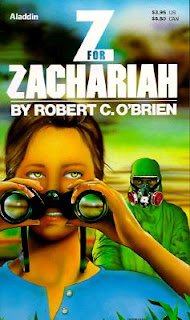Race, Love, and Luxorite: The Morality of Steeplejack
A.J. Hartley's new novel Steeplejack seems at first to be an issue book about race relations touting itself as a mystery. Within the first five chapters, the protagonist -- a Lani steeplejack named Anglet Sutonga -- faces misogyny, assault, racial stereotyping, poverty, and more from police, her community, her boss, and even her own family.
I almost put the book down.
It wasn't that these issues were difficult to read about or that the book portrayed them unrealistically; it was the fact that in such a short span the main character seemed to have hit all the talking points available for a poor, teenage woman of color protagonist. It felt like the author was trying too hard to cover "the issues" and not enough to tell the story.
But then the mystery aspect of the story kicked into full gear, and the two aspects of the book began to balance each other out, eventually intertwining in a very skillful manner.
Race is an issue in this book; it's set in a sort of alternate, somewhat post-colonial South Africa. I say somewhat because while on the surface of the culture the black and Lani populations are free from their colonial enslavement, the reality is that they aren't as free as their white neighbors.
This book deals with race and race relations in a nuanced, heartfelt manner. Any generalizations about one group or another tend to get swept away as we are introduced to more characters in each group.
While the book works best when it's focusing on the mystery and letting race fit into the world without being the crux of a given scene, the heart of this book is love in its many forms.
Ang's motivation throughout the book is solving the murder of Berrit, a young apprentice that Ang had barely met. Many times throughout the book, Ang is asked why she cares; she never knew him. For most of the book, she implies that she wants to solve his murder because someone has to care about him, because he was Lani, because he was a steeplejack. In the climactic encounter with Berrit's murderer, however, Ang reveals a very powerful truth.
"Why does everyone keep saying that?" I remarked, realizing the importance of the question as I said it. "Why does whether I knew him or not matter? He was a child, a boy you murdered. I have to avenge him because I didn't know him. Because he will never have what other boys his age look forward to. He was snuffed out, all his possibilities ended by your knife, and I am not supposed to care because I didn't know him? Who are we if we care only for our own, [name of murderer redacted due to spoilers]? What are we? What separates us from the hyenas and the weancats is that we care for those we don't know, those who have nothing and nobody they can rely on."
Though they take a more humanist approach, Ang's words in this paragraph reflect those of Jesus in Matthew 5:46-47: "If you love those who love you, what reward will you get? Are not even the tax collectors doing that? And if you greet only your own people, what are you doing more than others? Do not even pagans do that?"
In contrast to Ang's desire for justice on behalf of a fellow nobody, the conspirators responsible for Berrit's murder don't even look our for their own people; they show no regard even for those who love them and whom they claim to love thanks to the greed that overtakes them. One of them even threatens Ang's infant niece in order to force her cooperation.
Ang's moral fortitude doesn't just hinge on finding justice for Berrit. She spends part of the book trying to save her infant niece from being killed or given to heartless nuns because she is an unwanted fourth child. When Ang has an opportunity to kill the man who assaulted her or report him for a theft he didn't commit, she chooses to do neither, not because he isn't guilty, but because killing him would be wrong in that moment -- murder, not self-defense -- and framing him for the theft would not being Berrit's killers to justice. It would simply give her revenge and allow the true villains of the story to go free.
If you enjoy mysteries, alternative history, or diverse characters, this book is for you.
(I received an ARC of this book through Tor Teen. This review was published simultaneously on Goodreads and Inexhaustible Inspiration.)




Comments
Post a Comment
What do you think?